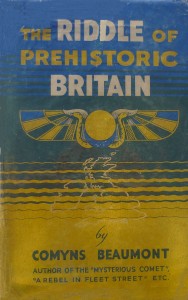Rating: 









I came to this author via John Mitchell’s “Eccentric Lives and Peculiar Notions” where Comyns Beaumont is the subject of Chapter 15. There he is described as a ‘revisionist geographer’, which, considering he claims many of the original locations of ancient Greece, Egypt, and Palestine in Britain, is something of an understatement.
which, considering he claims many of the original locations of ancient Greece, Egypt, and Palestine in Britain, is something of an understatement.
 which, considering he claims many of the original locations of ancient Greece, Egypt, and Palestine in Britain, is something of an understatement.
which, considering he claims many of the original locations of ancient Greece, Egypt, and Palestine in Britain, is something of an understatement.He noticed the similarities between British place names and those in the ancient world, and concluded that many of these places had, in reality, been in Britain itself. Loch Carron in Scotland, for instance, and the nearby village of Erbusaig sounded to his ears strangely like Acheron, the Greek river of hell, and the mythical purgatory Erebus. Achilles, the Greek hero, grew up on the island of Skyros, which could be none other than the Isle of Skye. Bath had to be Athens; the names of the two cities were too similar for it to be otherwise.
Then, reasoned Comyns Beaumont, if the Flood had occurred in north-western Europe, it was surely likely that Noah, and every other biblical character, had lived there too. The British Isles were the true cradle of world civilization.
Once inspired with that idea, Comyns Beaumont was not to be waylaid by the facts. For his theory to be consistent, all the other peoples and places of the classical world had to be in or near Britain. With unending energy he redrew the map so that the ancient countries of the Mediterranean and North Africa fit neatly into the map of Britain. It was irrelevant that Athens or Jerusalem, Crete or Ethiopia, persisted in occupying their habitual sites in modern times.
The impeccable logic of Comyns Beaumont insisted that historians had distorted the truth in order to glorify their own countries, unlike himself. It was clear from a “true reading” of the records that Ethiopia was Ireland, Sodom was Bristol, Crete was just another name for the Shetland Islands.
All this was consistent with Comyns Beaumont’s lifelong belief in the innate superiority of all things British. His career as a journalist had been dogged by his frustration with newspaper owners and editors who, he believed, failed to represent British interests adequately. His new theory of ancient history restored the balance, to his satisfaction at least, and to the amazement of all those who read his books.(1)
What can be said in recommendation? No one today is surely going to take the central premise of his book at face value; however it occurred to me that unlike many authors today, he was grounded in an old school classical education, and spent a lifetime refining his ideas based on the original Greek writers and also the British antiquarian tradition.
One idea in the book I would like to research further, is whether the Greeks ever regarded Hades (Hell) to be a physical location, and if so, was it originally a place of torment, as later portrayed, and adopted by the Church?